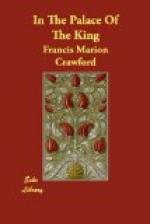CHAPTER I
Two young girls sat in a high though very narrow room of the old Moorish palace to which King Philip the Second had brought his court when he finally made Madrid his capital. It was in the month of November, in the afternoon, and the light was cold and grey, for the two tall windows looked due north, and a fine rain had been falling all the morning. The stones in the court were drying now, in patches, but the sky was like a smooth vault of cast lead, closing over the city that lay to the northward, dark, wet and still, as if its life had shrunk down under ground, away from the bitter air and the penetrating damp.
The room was scantily furnished, but the few objects it contained, the carved table, the high-backed chairs and the chiselled bronze brazier, bore the stamp of the time when art had not long been born again. On the walls there were broad tapestries of bold design, showing green forests populated by all sorts of animals in stiff attitudes, staring at one another in perpetual surprise. Below the tapestry a carved walnut wainscoting went round the room, and the door was panelled and flanked by fluted doorposts of the same dark wood, on which rested corbels fashioned into curling acanthus leaves, to hold up the cornice, which itself made a high shelf over the door. Three painted Italian vases, filled with last summer’s rose leaves and carefully sealed lest the faint perfume should be lost, stood symmetrically on this projection, their contents slowly ripening for future use. The heap of white ashes, under which the wood coals were still alive in the big brazier, diffused a little warmth through the chilly room.
The two girls were sitting at opposite ends of the table. The one held a long goose-quill pen, and before her lay several large sheets of paper covered with fine writing. Her eyes followed the lines slowly, and from time to time she made a correction in the manuscript. As she read, her lips moved to form words, but she made no sound. Now and then a faint smile lent singular beauty to her face, and there was more light in her eyes, too; then it disappeared again, and she read on, carefully and intently, as if her soul were in the work.
She was very fair, as Spaniards sometimes are still, and were more often in those days, with golden hair and deep grey eyes; she had the high features, the smooth white throat, and the finely modelled ears that were the outward signs of the lordly Gothic race. When she was not smiling, her face was sad, and sometimes the delicate colour left her clear cheek and she grew softly pale, till she seemed almost delicate. Then the sensitive nostrils quivered almost imperceptibly, and the curving lips met closely as if to keep a secret; but that look came seldom, and for the most part her eyes were quiet and her mouth was kind. It was a face that expressed devotion, womanly courage, and sensitiveness rather than an active and dominating




